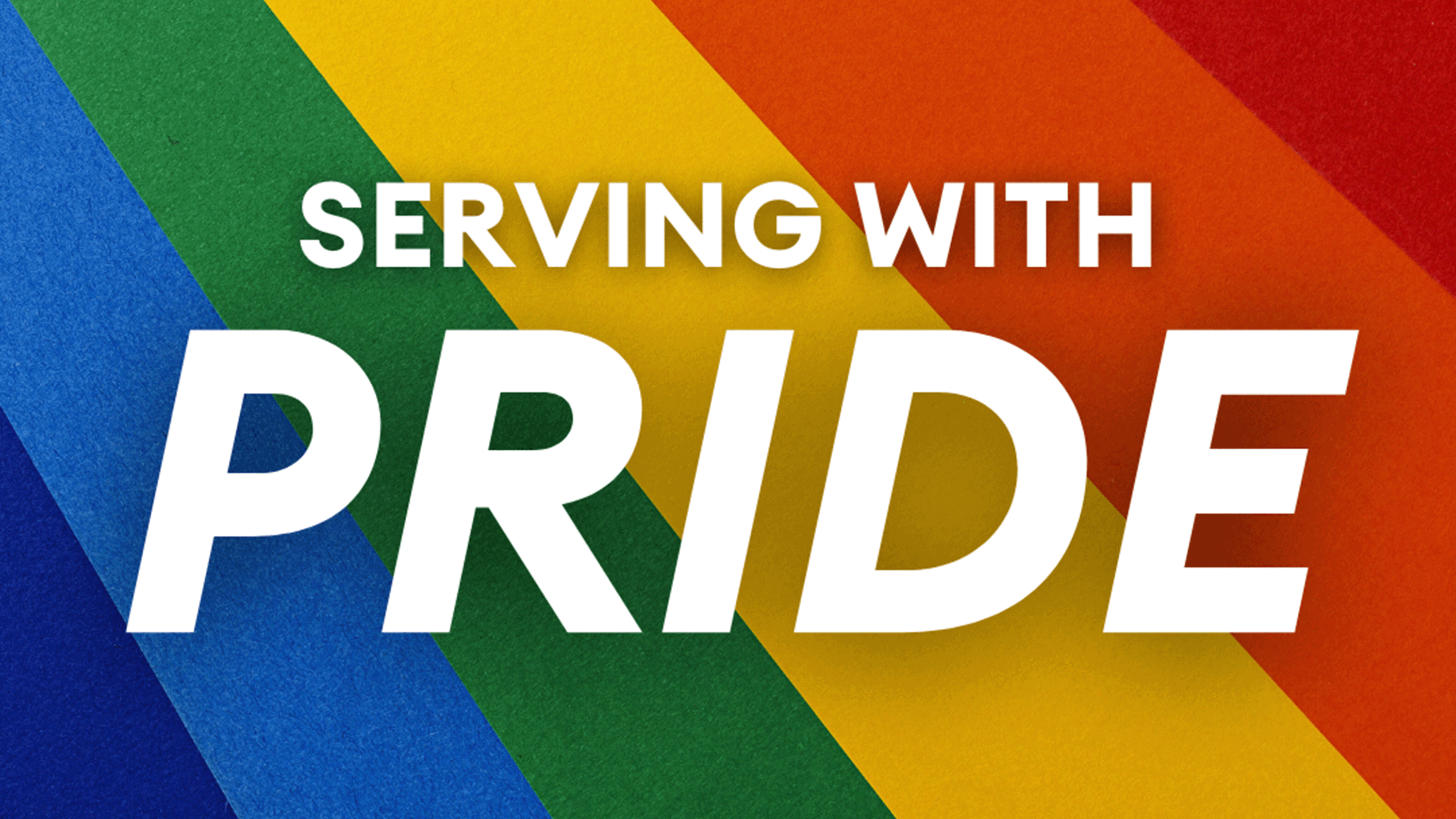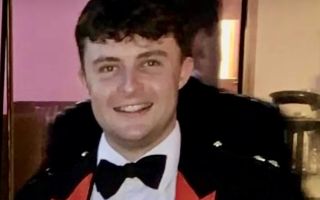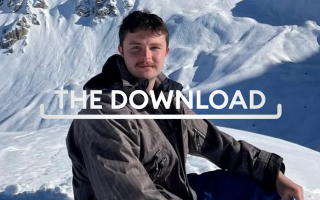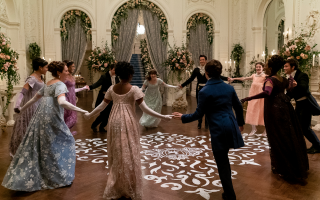
Serving With Pride: Military personnel and veterans share their experiences of being LGBT+ in the Armed Forces

Gay service personnel have been speaking about their experiences of working in the Armed Forces, 23 years after the ban preventing LGBT+ people from serving in the military was lifted.
Despite homosexuality in England and Wales being decriminalised in 1967, LGBT+ members of the Armed Forces were forced to hide their sexuality until the ban on them serving was lifted in 2000.
Some found being able to discuss their sexuality quite difficult after years of hiding their true identity, like Brigadier Clare Phillips who said: "Having lived a life of self-preservation... it was really hard to take those first steps of then trusting the very people who would now know that I'd been lying to them."
While gay service personnel were fighting to protect the freedoms of others, their own freedoms were being restricted.
Many serving LGBT+ personnel were forced to hide their sexuality for fear of prosecution and being thrown out of the Armed Forces.
To mark Pride Month – a time dedicated to celebrating lesbian, gay, bisexual and transgender people – BFBS the Forces Station has spoken to several LGBT+ service personnel for their series Serving With Pride to find out just how far the Armed Forces have come since 2000.
Since joining the Royal Military Academy in 1995, Brigadier Clare Phillips has enjoyed a decorated career with the Royal Electrical and Mechanical Engineers (REME) and beyond.
The pinnacle of the REME part of her career was becoming the first woman in the British Army to be appointed Corps Colonel, the representational head of the REME.
Today, her role is that of Deputy Military Secretary – the second in command of the Army Personnel Centre.
In her 28 years in the British Army, Brig Phillips says she has seen a huge cultural shift in terms of how she is treated by her colleagues since the ban was lifted, saying: "Whilst it was an enormously momentous occasion, what none of us could anticipate was how our colleagues would react to that change.
"But... as I came to trust close colleagues and I met new colleagues and times changed and people became more outspoken about their support for the LGBT+ community, bit by bit, I think I, and I suspect others, felt safe to share a little bit more information."
Fast forward 23 years and Brig Phillips sees how important it is for other LGBT+ personnel to see a gay woman with her level of seniority "being deliberately and overtly confident and comfortable" with her sexuality.
She hopes that will speed up the process of LGBT+ personnel gaining trust in the people with whom they work.
Brig Phillips says her wife has always felt welcomed by the British Army and has been treated just the same as any partner in a straight marriage would be.
She said: "The moment that I realised how far the Army had come was just before I finished up in my job as a CO for leave and we were running off to New York to get married.
"All of the officers in the battalion had remarkably, kindly, put together to buy us a wedding present.
"I suspect that they didn't realise quite how significant that felt.
"For that to happen for me when I was in a gay relationship and I was going to New York to marry my wife... I felt seen, I felt welcomed, I felt understood."
For some, feeling welcomed by work colleagues is boosted by their involvement in military sport.
Flight Lieutenant Louise Tagg has worked all manner of roles in her nine years in the Royal Air Force.
Before she joined the RAF, Flt Lt Tagg played volleyball for England and said she found that her sexuality had an impact on her experience, saying: "Predominantly because it wasn't as widely accepted, or it was quite a fascination factor for people which took my focus away from performing... at my best."
Only when she joined the RAF did the volleyball player say she feel like her sexuality wasn't a problem because she was suddenly surrounded by many other gay people in her team.
She said: "What's quite nice about service sport is that it spans all ranks, all gender identities and all sexualities, and I think that's really important for getting the most out of people both inside and outside of work."
When in a work environment, Flt Lt Tagg feels most herself with her UKAF volleyball team.
Spending time in a team with at least one third either LGBT+ or belonging to another protected characteristic has been a "real highlight" of Flt Lt Tagg's service career.
She said: "We've got a huge Commonwealth domination in our team too so we're a real nice mix of everything and that's been a real positive in my life."
Commander Mandy McBain left the Royal Navy in 2012 after 25 years of service during which she led her colleagues at London Pride in 2008.
Now a diversity and inclusion specialist, Cdr McBain was awarded an MBE in the 2012 New Year Honours list for her work on equality within the Royal Navy.
After working for LGBT+ charity Stonewall for 10 years, she has re-joined the senior service on an additional duties contract and is in charge of the Royal Navy's response to the recommendations laid out in the Government's LGBT Veterans Independent Review.
Cdr McBain believes inclusivity is of vital importance, especially when service personnel are expected to work at an intense pace and the operational commitments change regularly.
She said: "People are asked to do a lot with long working hours at certain times and so they have to feel comfortable with their colleagues to be able to give themselves to whatever that operational requirement is.
"I think it's really important that they feel included because none of us like to feel excluded no matter what it is.
"It's a horrible feeling of feeling quite alone."
Feeling accepted, no matter your sexuality, goes hand in hand with Pride – a term used to promote inclusion, dignity and respect for LGBT+ people.
Being part of this vibrant, global movement for action has changed over the years for Cdr McBain.
At first, while hiding her sexuality before the ban was lifted in 2000, she was desperate to join in but felt as though she couldn't, saying: "I didn't want to be hunted down or, you know, seen at something that would indicate I may be gay."
Today, Pride feels like "a joyous occasion" which she has shared with her RAF veteran wife and young son.
While her son is oblivious to the struggles his parents have endured over the years, Cdr McBain says it's nice to have the freedom to take her son to school knowing it's going to be OK.
Although she is acutely aware that not every LGBT+ person is as fortunate as she is.
It's something Able Rate Nicole Scahill is also aware of.
The Royal Navy Medical Assistant is co-chair of Royal Navy Compass, the sexual orientation, gender identity and expression network of the Royal Navy, Royal Marines, Martime Reserves and Royal Fleet Auxiliary.
She feels quite lucky to have had a positive experience when it comes to gender and sexuality in the Senior Service, saying: "I've never, ever had an issue where I felt that I'd not been welcome or that I am unequal to someone else.
"Not everyone that I've met has been that lucky but from my personal experience, I have been quite lucky."
AB Scahill has met more LGBT+ people in the Royal Navy than on civvy street.
The Senior Service has been a real champion of diversity and inclusion, saying on their website: "Encouraging and promoting differences in our backgrounds and experience makes us a healthier and stronger fighting force.
"Our operational effectiveness is delivered by the right mix of capable and motivated people that reflect the breadth of society we exist to defend, now and in the future.
To ensure this, the Royal Navy moved away from "gendered language" in 2020, by swapping terms such as 'unmanned' for 'uncrewed'.
AB Scahill said: "When you see the difference that the Navy was 20 years ago to what it is now, like, to constantly see like policies and stuff being updated to work with the new generation that's coming through to make everything more diverse and equal.
"We're really big on [diversity and inclusion] and training and all that.
"It's always a case of we want to progress with the world and make it more welcoming to make more people feel that they can join without being scared."
You can hear the full Serving With Pride series at bfbs.com/pride.







